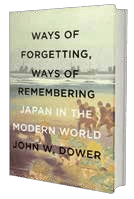Issue:
BOOK REVIEW WAYS OF FORGETTING, WAYS OF REMEMBERING: Japan in the Modern World
By John W. Dower (New Press 2012)

by Miki Tanikawa
Ways of Forgetting, Ways of Remembering is appropriately titled. But perhaps any sharp historiographical accounts could share the same title; like the very point the author makes, a history book is about revealing what the writer wants to highlight while neglecting what he wants to hidea willful choice between the “focused gaze” and the “averted gaze,” in the author’s lingo.
Dower is an MIT history professor and recipient of the Pulitzer Prize for his book, Embracing Defeat: Japan in the wake of World War II. This latest book, a collection of essays published previously, may be an attempt to find a moment of resonance for them since he is painfully aware that certain renditions of history don’t register when your approach goes against the prevailing winds.
In the 1960s, when Dower was embarking on an academic career, his approach to historical research was decidedly liberal (some would say “Marxist”) and unambiguously close to that of E.H. Norman, a Canadian diplomat and historian who tragically committed suicide after becoming a target of the McCarthyist witch hunt in the 1950s. It found little resonance in an academic milieu that strongly favored a much more conservative “modernization theory,” which premised that all nations, when properly configured socially and economically, would follow the social development model of the west. The first chapter of this book, describing Norman’s contribution to the field of modern Japanese history, reads like a eulogy dedicated to this man whose work Dower so admires. He is deeply sorrowed by the tragic consequence of his life and the sub sequent burial of Norman’s excellent work on Japanese history, at least for a time.
Dower’s ire against the conservative forces is on ample display as he vividly recalls the “Smithsonian incident” in the mid-’90s, when the museum’s planned exhibition of the B-52 bomber was abruptly canceled after meeting with harsh conservative opposition (though it was later revived in gelded form). He deplores how the “revisionist” label had replaced the “communist” label that the liberals so feared being slapped with in the years after the war.
His greatest angst is reserved still for the Bush administration’s deliberate comparison of the U.S. experience with Japan after WWII and the American invasion of Iraq and how reshaping that country could be success fully brought to a close an idea which Dower easily dismisses. The American Occupation in Japan had enormous moral as well as legal legitimacy in the eyes of the rest of the world, including in neighboring Asia that had been so recently savaged by the Japanese war machine, Dower argues. (He cites other technical reasons for the absurdity of the comparison.)
Aside from serving up a scathing critique of the American conservative’s view of history, this collection of essays is a gem of a book for both educational and recreational reading. His interpretations of the events and perceptions of the general Japanese public, something that requires a complex and layered understanding of Japanese society, are far more accurate and balanced than many other books on Japan written by non Japanese authors which often trigger a negative gut reaction by Japanese readers. His judiciously chosen sources that include various Japanese public opinion polls and close examination of popular culture give him an edge that many Western journalists, often drawn to the voices of the “elite” politicians and commentators, miss out on.
Dower similarly exhibits a canny gift of digging deep into social and cultural workings, another result of his trait of peering into the non-elite strata of the society. In one example, he examines the flourishing use of high art during the Pacific War in the effort to beautify the war. Woodblock prints portraying the valor of the Japanese navy, silk kimono featuring Japanese battleships, and a serialized comic featuring the feisty black stray dog “Norakuro,” which debuted in the ominous year of 1931 when Japan invaded Manchuria were all mobilized to romanticize the war effort, and all have parallels today. One only has to look at the way manga have been used to sanitize seemingly indigestible social dilemmas such as the use of nuclear power plants in a crowded, earthquake prone nation.
His street level views of history come in handy once again when he closely examines the use of karuta word games (the syllable cards) that came into vogue among the postwar Japanese as a vehicle for satire, mocking misery and playing to the new found cynicism.
Dower’s incisive remarks about the Japanese reaction to the war include the vastly dodged topic here: the public responsibility of the Emperor for the war. He asks, “If he was deemed to have no responsibility whatsoever for the horrors and disasters that took place between his ascension to the throne in 1926 and the end of the war in 1945, why should ordinary Japanese even think of taking responsibility on themselves?”
As Japan turns the page of a new political chapter with the conservative LDP swinging back to power, is it not useful to rethink Japan’s prewar and postwar past with illuminating commentary and insight on the political and social events that transpired? Dower plays that guide to Japan’s recent past quite well.
Miki Tanikawa writes for the International Herald Tribune and teaches Japanese history and international relations at JICA and other universities in Japan.

